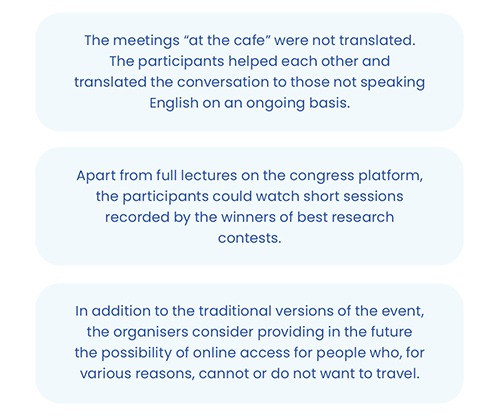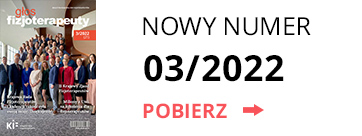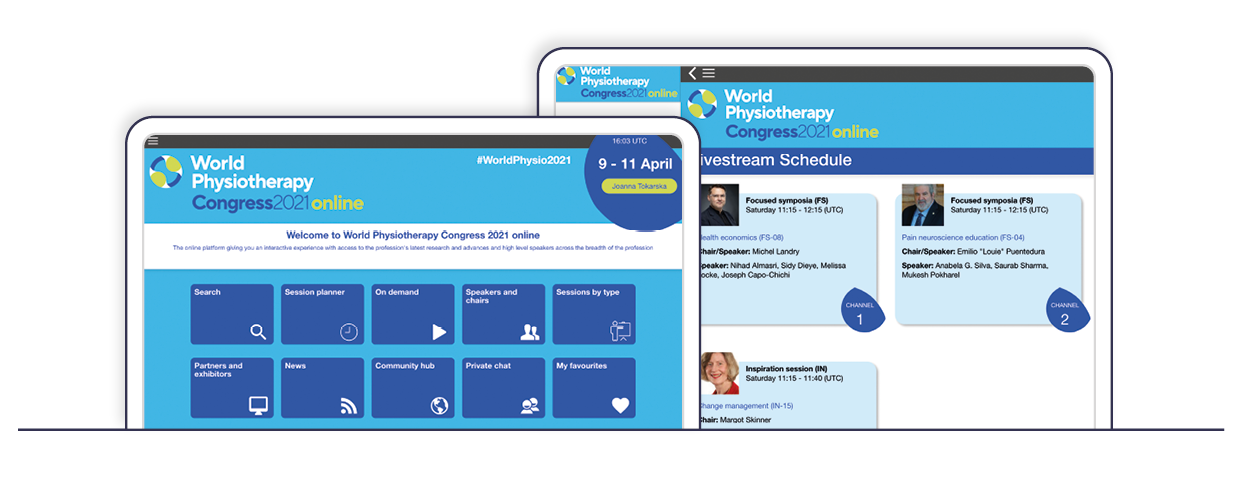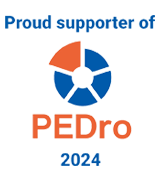The year 2020 was unique. The ongoing pandemic did not make it easier for World Physiotherapy to organise a World Congress – the world’s biggest event of this type. Originally, it was to take place in Dubai, where apart from substantive content the participants would have received a chance to establish direct contacts with the representatives of the profession from different corners of the world. It is no secret that attending a conference is not only about obtaining the latest knowledge but also about a chance to establish valuable contacts at the proverbial coffee machine. All of that was to be missed.
The only way of organising the congress during the pandemic was to hold it in the virtual format. And although it does not sound as exciting as the traditional form, there were over two thousand people who signed up for the event. Two thousand people from different corners of the world, different nationalities and cultures and different time zones. For some, participation in the congress meant three nights without sleeping! However, good attendance at the keynote lecture showed that nothing could stop the participants and the organisers were technically well-prepared for the event. There were 1200 people watching uninterrupted online transmission at the same time.
Lectures, that is creme de la creme of the event
There are many physiotherapy conferences organised worldwide, but this one was exceptional. During the three days, the participants had a chance to attend lectures strictly connected with the profession they practice (e.g. musculoskeletal disorders, pain and its therapy, paediatrics, geriatrics etc.), but also sessions that allow them to look at it from a broader or completely different perspective. Examples of such topics can be issues connected with the health of refugees and migrants, the issues of oppression, marginalisation and stigmatisation or discrimination of women exercising the profession of a physiotherapist.
The speakers delivered their lectures in the English language. The organisers provided the participants with access to the Wordly system, which simultaneously translated what the lecturers were saying into different languages, including Polish. The translation was displayed in the form of subtitles. It is worth adding that while the lectures were usually pre-recorded, the discussions that followed them were live. The organiser made it possible to ask questions through the option of chat on the congress platform.
Face to face with the professor
The participants could also meet the lecturers during more intimate networking sessions or talks „in the cafe.” Going to the cafe meant in practice that by logging into World Cafe you found yourself in a room with only a few randomly selected people with whom you could talk on any subject. A morning coffee with the chair woman of an association in a distant country? A quick chat with the chairman of the largest organisation in Europe? What about a face-to-face meeting with Emma Stokes – president of World Physiotherapy? Everything was possible during those sessions. In that way, the organisers provided a substitute for the real meetings that take place at the classical congress.
In a similar form, the participants could attend networking sessions, that is meetings during which the representatives of different countries were discussing specific topics. They were organised by WP’s subgroups, which bring together organisations dealing with such issues as neurology, manual therapy, paediatrics or other. Poles participated in them as well.
In my country…
The meetings in thematic sub-groups provided a chance to learn about the specificity of the work in different regions of the world. What is the standard for countries such as Poland (e.g. widespread accessibility of physiotherapeutic services) remains an aspiration for others, as was admitted, for instance, by the representatives from Philippines. Meanwhile, countries with many years of practice in providing physiotherapeutic services, such as Australia or New Zealand, shared their experiences in implementing modern forms of financed physiotherapies, which are beneficial to all the parties. An example is telerehabilitation in New Zealand, which is treated by the insurer as a service equivalent to a face-to-face meeting.
The World Bank regards Poland as a high income country, which suggests high level of income and a well-developed health care infrastructure. However, in terms of earnings, our physiotherapists compare poorly to their peers from New Zealand, Australia or the USA. This is the reason of frustration in the community and a subject frequently addressed in public debates. Does that mean that overall we lag behind? Definitely not. As one of few countries, we can boast the act on our profession, a separate governing organisation and direct access to a physiotherapist. The information that we were authorised as a professional group to give vaccines against COVID-19 was a huge surprise. Often, physiotherapists from the neighbouring countries wanted to know how they could implement solutions similar to ours in their own countries. It’s worth knowing that there are both countries that can be inspiration for us and those that are inspired by us.

“Equality, fairness, diversity and integration”
It’s probably not without a reason that a session with this title, led by Emma Stokes, took place on the first day of the event. These words illustrate the whole Congress World Physiotherapy 2021 well. We are inspired by the stronger, give the weaker a hand, accept diversity of both people and forms of work. If we want to be a profession of the future, let these ideals guide us. See you in Tokyo in 2023. Face to face or online!




